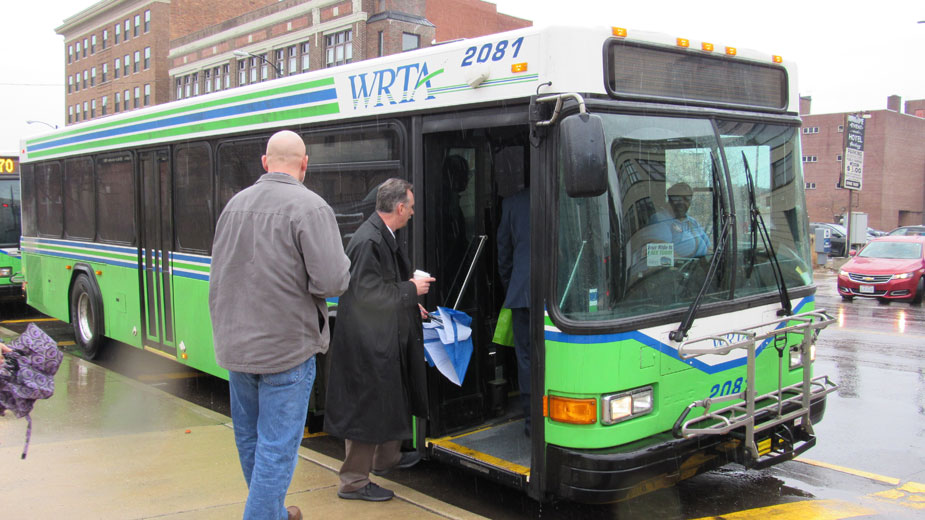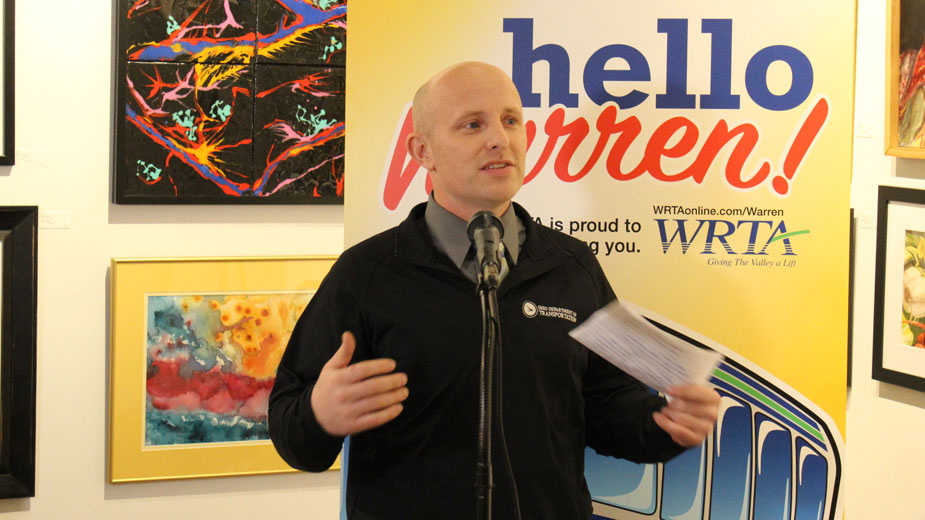By Josh Medore
WARREN, Ohio – The arrival of new daily bus service to Warren and other Trumbull County communities isn’t just a boost for passengers looking to get to the grocery store or doctor. It’s finally providing an answer to one of the first questions companies ask when they look at moving into the area.
“One of the first things all our economic development agencies tell us that companies look at is transportation. They want to get their people to and from work,” said Trumbull County Commissioner Mauro Cantalamessa. “There’s also a health and wellness side. There are so many food deserts, especially in the city of Warren and urban areas. Now, they’ll be able to go to Walmart or Giant Eagle. It’s going to help across the board.”
Even for local companies that are already here, the new service will better connect them to the workforce that can help fuel their growth, said Darlene St. George, Howland Township administrator.
“The route that’s going through the Golden Triangle is huge for those businesses. We have one of the largest manufacturing hubs in the state with over 3,000 jobs. Those companies are expanding and adding jobs. This adds another element, another layer to make sure people can get to work when they need,” she said. “We’re over the moon about what this does for Trumbull County.”
Cantalamessa and St. George were among the officials at the kickoff event for Western Reserve Transit Authority’s service in the county, offering six fixed routes, the Warren Express route from downtown Youngstown to Kent State University Trumbull and scheduled services.
The routes pass through all of Warren’s major corridors, including U.S. Route 422, Market Street east and west of downtown, Elm Road and Larchmont Avenue. A map of the fixed routes is available here.
“I can’t overemphasize how important public transportation is to the life and fabric of our community,” said Warren Mayor Doug Franklin. “The biggest benefit to our citizens is it gives those who are transportationally challenged access to our whole community and services through the whole county.”

Beyond the fixed routes, the expansion into Trumbull County also brings WRTA’s Countywide service, which allows users anywhere in the county to schedule pickups up to a week in advance and offers discounted rates for seniors and those with disabilities.
“Having those services augment what we’re trying to do. It gets people out of their homes and gets them to the doctor or to food. It gives them a quality of life that they wouldn’t have without these services,” said state Sen. Sean O’Brien, who worked with state Sen. Michael Rulli to secure the funding in the state budget. “The money we spend on this is nothing compared to the benefit we get for quality of life, economic development and being able to say, ‘You can grow old here and still have a good life. You don’t have to move. You can be independent.’ ”
The work on bringing the service to the county began about a year ago and was finalized with a $1.8 million grant from the Ohio Department of Transportation that funds the service through May 2021.
“This is a prime example of what we’ve done. This is a local decision to expand WRTA and designate it as the service for Trumbull County. There are many small, urban communities like Trumbull County across Ohio that are in the same position and struggling in the same ways,” said Chuck Dyer, administrator of ODOT’s Office of Transit.

Statewide, there are 63 transit systems serving 66 of Ohio’s 88 counties, he said. In an analysis done a few years ago, ODOT highlighted ways to expand access to public transit: regionalism and coordination. The WRTA expansion is an example of both, Dyer said.
“What makes it work is always the people and their willingness to come together,” he said. “I thank this whole community and Dean Harris for your leadership. We’re encouraged to be working with you on this.”
While there’s no guarantee that the routes would continue beyond then, the officials speaking at the kick-off event urged residents to use the service and show that it’s needed.
“Hopefully, if it’s successful, the Trumbull County Commissioners will look at continuing the service or the state can find funding,” said WRTA’s executive director, Dean Harris. “It hasn’t been decided yet, but we want to continue to provide service to Warren and Trumbull County.”

Through the end of the week, WRTA’s fixed-route service in both Mahoning and Trumbull counties will be free, he added.
“Offering it for free is really the best way to introduce it to Warren while also connecting Youngstown to Warren. It’s a way to show all our services,” he said.
It’s been nearly three decades since Warren had regular bus service, Franklin said, and bringing back busing has been a “silent campaign” since he took office in 2011.
“I kept hearing about over and over again. It’s gratifying to come up on this day and see it become a reality,” he said.
When he first took office, the county bus system has been classified as nonfundable by the federal government, he said, due to reporting errors and the “a dysfunctional system that we had, through no fault of the participants.”
“Our work started out being damage control and seeing how we could public transportation back to where it was,” he said. “Well, we went a step further and have enhanced our public transportation.”

Among the citizens Franklin recognized for their work on helping convince leaders to bring public transit to Warren was Janet Hazlett. A longtime advocate for such transportation, Hazlett collected data on the Warren Express route since it launched and has met with Franklin, the Trumbull County Commissioners and WRTA leaders.
“It’s not over. This is halfway through. It’s only funded temporarily and they have a grant that covers fixed-route in Warren. You need other connections,” she said. “Niles needs people to move around. Girard needs people. There are people who need to get from Newton Falls to Warren or Cortland to Warren. Those things need to be in the future.”
Her years of work, she said, stems from her childhood access to Warren’s public transit system, which ran past her house.
“It allowed [my mother] to get places. It allowed us kids to get places,” she said. “I advocate for young people who need to get to work or want to stay after school and be involved in a club but need transportation. It gives people freedom.”
The next step, she said – in agreement with the officials – is figuring out how to continue the Trumbull County service beyond the date the ODOT funds expire.
“It’s going to depend on the community to advocate for it. I’m a boomer. I’m 65. There are older people who don’t want to pay the extra quarter of a percent tax or something,” she said as a WRTA bus waited just outside for a ceremonial first ride for those attending the kickoff event.
“When I was young, up at Packard and the Golden Triangle, there were dedicated buses that took people to those jobs,” she continued. “I remind older people that your parents and you were able to build a life because you were able to get places and people today deserve that same advantage that you had.”